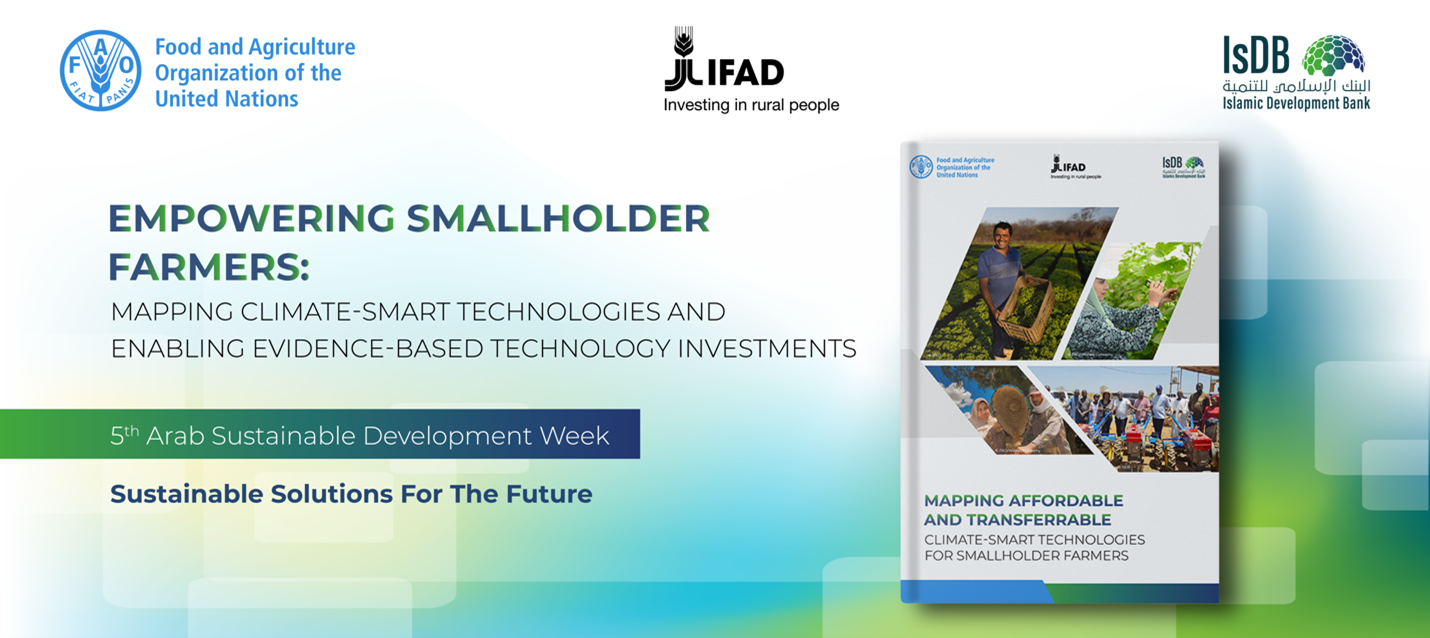Empowering Smallholder Farmers: Mapping climate-smart technologies and enabling evidence-based technology investments
Virtual Event, 25/11/2024

Background
As we navigate an era marked by climate change, resource scarcity, and economic uncertainties, smallholder farmers find themselves at the frontline of these challenges. They are the backbone of our agricultural systems, yet often the most vulnerable. Empowering them with the right tools and technologies is critical for building resilience and ensuring sustainable development. Recognizing these vulnerabilities, the "Mapping Affordable and Transferrable Climate-Smart Technologies for Smallholder Farmers", carried out by FAO-IFAD-IsDB, offers a targeted approach to equipping farmers with adaptable, sustainable solutions. By focusing on accessible climate-smart technologies, this exercise aims to bridge the gap between global innovation and local application, enhancing resilience across diverse agricultural landscapes.
Developed under the Tripartite Agreement between the Food and Agriculture Organization (FAO) Regional Office for the Near East and North Africa, the International Fund for Agricultural Development (IFAD) and the Islamic Development Bank (IsDB), the mapping exercise and its synthesis report identifies essential technologies across six thematic areas: 1) postharvest, reducing food loss and waste; 2) water management and water saving technologies in face of climate change; 3) sustainable pest control and crop management; 4) e-commerce and market access, 5) fintech; and 6) green energy for farmers agribusiness operations. The mapping was carried out in 10 countries – including five in the Arab region – namely, Egypt, Jordan, Palestine, Morocco and Tunisia, as well as Bangladesh, Brazil, Nigeria, Tajikistan, and Turkey.
The assessment methodology was transformed into a Green and Climate Smart Technology Assessment Tool (GC-STAT), an Excel-based tool allowing adaptable evaluation scores and criteria weights. The GC-STAT is a decision support tool, designed to empower stakeholders with data-driven insights for selecting context-appropriate solutions.
This Session is under the umbrella of the fifth edition of the Arab Sustainable Development Week (ASDW-V) taking place in Cairo from 24 to 27 November 2024.
Objective
The session aims to explore the methodology used to identify viable technologies, showcase GC-STAT’s role in decision-making, highlight the technologies identified for diverse agricultural contexts, and reflect on the opportunities for scaling these solutions across the Arab region through partnerships and policy support.
Speakers
Lead specialists from FAO, IFAD and IsDB
Agenda
Time |
session |
3:00-3:05- OPENING – quick introduction of the session, partnerships and handover to Bassel/May for presentation Zeinab Awad, Country Programme Coordinator, Egypt, IFAD | |
MAIN PRESENTATION | |
3:05-3:40 |
|
DISCUSSION | |
3:40-4:10 |
(Moderated by Zeinab Awad, IFAD) |
OPEN FLOOR FOR QUESTIONS FROM THE AUDIENCE AND CLOSURE | |
4:10-4:30 | Q&A SESSION
|
